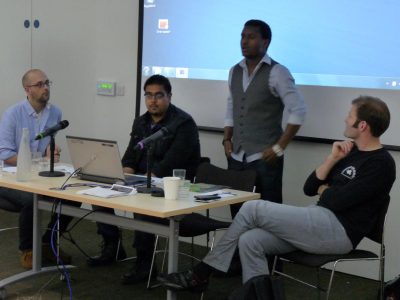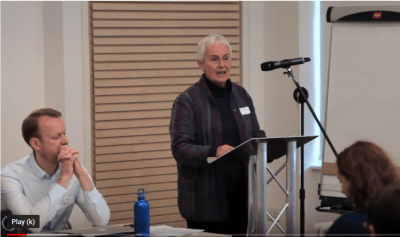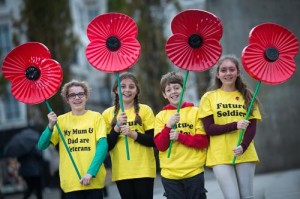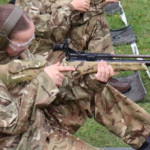Militarising Communities: The Armed Forces Community Covenant
Vron Ware reports on how the Armed Forced Community Covenant is a crucial part of the creeping militarisation of UK society. This article was originally published in Red Pepper.
Launch of new film on the military and young people
ForcesWatch comment

On Thursday 26 June 2014, we launched our new short documentary film 'Engage: the military and young people', at Friends House in London. A packed and diverse audience watched the film, which was very well-received. Speakers included Ben Griffin, founder of Veterans for Peace UK, Sam Hepworth from Headliners (the youth journalists charity who made the film) and some of the young filmmakers, and Owen Everett, Education Campaign worker at ForcesWatch.
War and peace
Letter to The Times (see all signatories below)
Letter to The Times (see all signatories below)
On this day 100 years ago, Archduke Ferdinand of Austria and his wife were assassinated in Sarajevo in an action that led to the First World War. Unchecked militarism in Europe was also a major factor.
Today is also Armed Forces Day, one of the clearest indications of the re-militarisation of British society. Established in 2009 to increase public support for the forces, there are over 200 public events, many billed as 'family fun days'. This week also saw Uniform to Work Day promoting the reserve forces and 'Camo Day' in schools.
Questioning military academies and free schools
ForcesWatch Comment
This article explains what we mean by 'military academies' and 'military free schools', and explores the concerns that they raise: the lack of evidence that they will raise attainment; that they can employ unqualified teachers; their limited accountability to the local community; the fact that they can set their own curriculum. Crucially, there are various agendas behind military academies and free schools, including providing employment for the growing number of veterans, and encouraging pupils to join the armed forces after they leave school. There is also unease about what military-style discipline would look like in a school environment.
Defence Committee report challenges the MoD (again) to produce a ‘robust and thorough’ review of under 18 recruitment
ForcesWatch comment
The Defence Select Committee have today released their report of inquiry into the MoD's Future Army 2020 plan. Amid the concerns about the strategy of increasing the proportion of reservists in relation to regular forces, the report calls on the MoD “to respond in detail to the argument that the Army could phase out the recruitment of minors without detriment to the Army 2020 plans”. Read our submission to the inquiry here.
Militarisation in everyday life in the UK: a conference report
ForcesWatch comment

In response to the recent developments in the UK, there has been an increase in critical academic studies, media coverage, and work by campaigning organisations and others on these issues. On 19 October 2013, around 70 academics, activists, campaigners, and writers came together in London at the Militarisation in Everyday Life in the UK conference organised by ForcesWatch.
Why are education projects run by ex-services being prioritised?
ForcesWatch comment
On 15 November 2013, the Department for Education announced "£4.8 million to projects led by ex-armed forces personnel to tackle underachievement by disengaged pupils".
ForcesWatch has a number of concerns about the military-led 'alternative provision' being developed in schools: who benefits? the armed forces certainly will; military-led 'alternative provision' targets young people seen to be 'failing' - precisely those who need more options and, if channelled into the forces, are most at risk in warfare; the policy is based on limited evidence and ideological assumptions; will there be space for ethical issues around conflict to be addressed?
Raising the age of recruitment: an open letter and a cautious welcome of the MoD review
ForcesWatch comment
ForcesWatch are among 24 signatories of an open letter to Mark Francois MP, Minister of State for the Armed Forces which calls for an end to the recruitment of under-18s.. The signatories include the Church of Scotland, the Church in Wales, the Unitarian Church and Catholic, Baptist, Methodist and Quaker groups and Child Soldiers International. The letter notes that as the centenary of the outbreak of World War One approaches, the recruitment and deployment age of British soldiers is lower now than it was a century ago. The signatories call on the Ministry to raise the recruitment age to 18 as a “fitting memorial” to the thousands of young soldiers killed in World War One.
The Poppy
David Gee, ForcesWatch

When I was about seven, my dad took me to the local Remembrance Day memorial. Neatly turned-out elderly men were stood in equally neat rows while The Last Post was played. I wondered why everyone looked so sad. Dad said it was because their friends had been killed in the war; this day was to remember them. I wore a poppy then and I am glad that I did.






